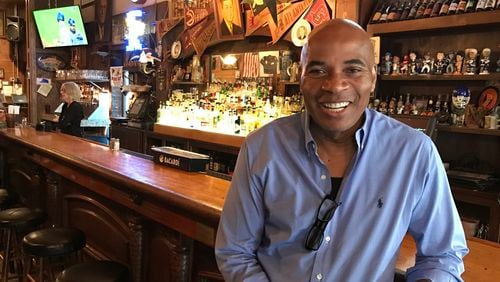This was posted Monday, May 22, 2017 by Rodney Ho/ rho@ajc.com for his AJC Radio & TV Talk blog
Tony Harris, a CNN anchor from 2004 to 2010, is back in Atlanta hosting an ID show "Scene of the Crime."
We sat down recently at Manuel's Tavern to catch up. Amazingly, despite being a journalist here for six years, he had never been to this popular media watering hole before. (He lives in Smyrna.)
He said he returned back to Atlanta a year ago after New York-based Al Jazeera America folded. He anchored there for about three years.
Staying in Brooklyn, he said, was "too expensive. I still had my home here in Atlanta. I was sick paying double," Harris said.
Besides, he said, "When I got the job at CNN in 2004 and picked up my family and moved from Baltimore to Atlanta, it felt like home. It became home for me, my family, my kids. We put down roots here."
Although he and his wife divorced while he was working at CNN, he kept a town home nearby his original house to co parent. Now, he lives in the original home.
"Scene of the Crime" is a six-episode crime series that is very much in ID's wheelhouse. With each episode, he picks apart a past crime, interviewing family members, friends, attorneys and police officers involved in what happened. In the most recently aired fifth episode, a 16-year-old cheerleader near Pittsburgh was stabbed 16 times a decade ago by her vengeful ex boyfriend, now in prison for life without parole for first-degree murder but still seeking a way to get it reduced to voluntary manslaughter.
Amid tasteful re-enactments, Harris confronts the dangers of violence and high school dating in the modern age and sharply questions the defense attorney for the murderer.
"It's not another murder show," Harris said. "We're taking on some social justice issues. We had a wonderful episode on two brothers in Texas. One was forced into a false confession. Another stood his ground and said he didn't do anything. The brother who maintained his innocence got a longer prison sentence."
The season finale aired last night. Past episodes for folks with cable or satellite subscriptions can access the episodes on demand here.
At CNN, Harris' favorite time was working in the Middle East during the Arab Spring and covered copious amounts of breaking news in the region, including the death of Muammar Quadafi in Libya. When CNN didn't renew his contract, he already sensed the changing landscape there. "I could see the shift to more panel television punditry," he said below a TV that was showing a CNN panel discussion. "It wasn't a fit for me."
So when Al Jazeera offered him a gig, he jumped at it. "How refreshing it was to watch a channel where there were so many diverse voices on the air," he said, "where there were so many languages spoken on the air." He got to speak to world leaders and travel to parts of the world he otherwise would have never gotten to see.
And believe it or not, he felt "as free there as I have ever worked. I really enjoyed it. It was not just the professional experience but kind of a personal awakening as well."
Three years later in 2013, when Al Jazeera America launched, the company asked him to be an anchor. "I was happy to do it," he said. "It was a different experience. It wasn't as enjoyable as reporting."
He felt the operation failed after three years partly because it wasn't thought out enough. "You build a house with a shaky foundation, it won't take long for the house to begin shaking," he said. "The writing was on the wall pretty early on." He said if they had embraced the initial tagline about being "the voice of the voiceless," the network might have had a better shot. If he had run the operation, he also would have created a more robust digital experience.
The name itself was an obstacle for many Americans who perceived the name too "ethnic" for comfort. "They were proud of the name," he said.
Harris has no desire to return to CNN under Jeff Zucker. "I understand what they're doing but it's not for me," he said. "It doesn't fit my taste." He hardly watches cable news now, he noted.
He now reads a lot of the Guardian and BBC. "I've had my viewing and reading tastes expand working overseas," he said. At the same time, he listens to people from both left and right to gain a broader understanding of the American mindset. "We have to be able to argue from the other person's point of view," he said.
Even before he left Al Jazeera, he hooked up with ID, doing a series of specials on topics such as "Hate in America." "I just felt extraordinarily blessed to have these conversations after years of empty promises of having national conversations," he said. "Hate crimes are rising. The number of hate groups are increasing."
After Al Jazeera America folded, he and the network came up with "Scene of the Crime."
"I've never met a network that knew itself better than this one," he said. It's one of the few cable networks that has seen rising ratings in recent years, targeting a very specific crime obsessed woman viewer.
And on his social media, he noted, "I've never gotten more followers for work than I am now."
He has also started a production company and is working on a dramatic series about a newscast that is (hopefully) more realistic than Aaron Sorkin's "The Newsroom" on HBO a few years back.
And he loves Smyrna but doesn't wander around Atlanta that much because of the traffic. "I have set my life in a five square block radius," he said.







